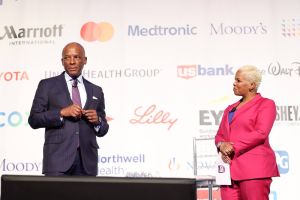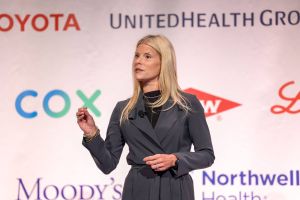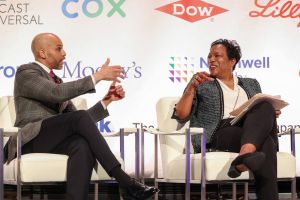The following session is from Fair360, formerly DiversityInc’s fourth annual Women of Color and Their Allies event, held Oct. 21, 2021. This year’s theme was “Sustaining Workforce Positions for Women of Color.” Throughout the day, panels consisting of researchers, thought leaders and executives shared their insights and strategies for helping women of color overcome common workplace barriers and spotlight allies working to sustain their positions within the workforce.
While Black men and women share some of the same plights, a certain amount of privilege comes with being a male. In this very important session, we will hear from Black male executives committed to advocating and mentoring women of color.
Panelists for the session included Ken Bouyer, Americas Director of Inclusiveness Recruiting at EY (a Fair360, formerly DiversityInc Hall of Fame Company); Clint Wallace, Senior Vice President of Human Relations at Sanofi U.S. (No. 27 on The Fair360, formerly DiversityInc Top 50 Companies for Diversity list in 2021); and Keith R. Wyche, Vice President of Community Engagement & Support at Walmart (No. 22 in 2021). Colton Palmer, Senior Partnership Manager at Fair360, formerly DiversityInc, moderated the session.
Key takeaways from the session:
Bouyer on how he builds strong mentoring relationships with others
“Successful mentoring relationships have to be based on trust and candor. And I set that expectation upfront. I think expectation setting on both sides — what their expectation is of me and what my expectation is of them — is essential. That trust and candor are critical because if we can’t trust or be open and transparent with each other, we’re not going to help each other.
“Oftentimes, when we mentor people, we can confuse them by not being as direct, transparent and clear as needed. Being honest is critical. I’ve seen mentor relationships where people try to play it safe because they worry more about themselves than the individual. They worry about managing their ego. When you have that expectation setting upfront, a relationship that says, ‘Look, I am going to give it to you straight, but with diplomacy and tact. It’s up to you with regards to what you do with it,’ the relationship benefits greatly. It’s served me well in all of the mentor/mentee relationships I’ve had.”
Wallace on why it’s sometimes so hard to be a good ally for others
“One of the things I often say to myself and others is ‘Look, there were others that came way before many of us, and they had to get comfortable with being uncomfortable by standing up.’ Folks like Rosa Parks and Martin Luther King Jr., I am certain, many years ago, were very uncomfortable, but for sustained change and to try to make a difference for the future generations to come, they had to get comfortable with being uncomfortable. For me, I put that in my head to say, ‘You know what? I’m going to do the right thing. And I am going to worry less about myself and worry about generations to come by speaking up and calling things the way I see it.’”
Wyche on the challenges many women of color face
“Throughout my career, I‘ve seen women of color — my peers — be mismanaged, undervalued and marginalized. Right out of college, when I went to work for a very large fortune 50 company, all of my male peers were hired in the more prestigious sales role, whereas most of my women peers were assigned to less prestigious, lower-paying support roles. I’ve witnessed that women of color don’t often receive the same level of feedback, support and mentoring from senior leaders. I’ve been in succession-planning meetings where hardly anyone recommended or highlighted women of color, and I’ve seen how stereotypes were actually inserted into these meetings that really damaged their brand. And it really saddens me.”
Wallace on why DEI in the workplace is so important
“If you want to have a healthy, balanced, and successful business, it’s common sense that you need a balanced portfolio of women within your organization that are balanced at all levels. In our company, we’ve been very bold and outward that by the year 2025, we’re going to have 50/50 gender parity at the senior-most levels of the company because we know that’s where decisions are made, and we know women can help shape and guide our company in incredible ways.”
Wyche on the secret to good allyship
“We need to be both intentional and deliberate in our efforts to be allies and advocates. The road to hell is paved with good intentions. Be deliberate about what you’re trying to do, making sure that you’re holding yourself accountable and asking yourself, ‘how many women of color do I mentor? How many do I sponsor? How many do I support? What can I do more of?’ The key to success in all these areas is ultimately about making all your actions deliberate.”
Bouyer on the excuses some companies make for not focusing enough on DEI
“There’s a great saying out there that says, ‘if you’re looking for an excuse, you’ll find one.’ My advice to allies is ‘no more excuses.’ Let’s stop looking. I’m not looking for excuses; I’m looking for action. I think you’ve got to define your why. Like, why does this matter to you? Why is it important to be an ally? I can list a ton of reasons. That’s my message to all the potential allies out there: think about your why — because we need you.
There’s another great saying: ‘while you have a seat at the table, don’t just sit there; do something.’ It’s time allies do something!”


















